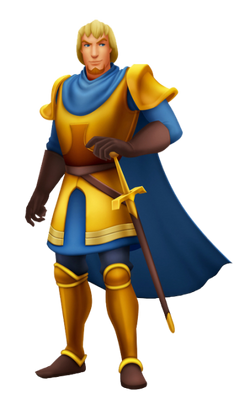Captain Phoebus is the tritagonist of Disney's 1996 animated feature film The Hunchback of Notre Dame. He is a gallant war veteran summoned by Judge Claude Frollo to assist in the eradication of Paris' Romani community. However, Phoebus' righteousness and love for Esmeralda drives him to betray his superior and fight for the liberation of Romani people.
Background[]
Personality[]
The Disney Animators chose to deviate from the book and created a down-to-earth Phoebus who is far less the dimwitted, womanizing cad that he is portrayed in the book. Though he tends to over-analyze and act like he knows what he's doing, he is described as a soldier who is sarcastically witty, brave, confident, and enjoys finding humor in situations. He also embodies the spirit of the Golden Rule: Treat others the way you want to be treated. Gary Trousdale admits that what he most likes about Phoebus is that "although he can keep a straight face when it's required of him, you can tell deep down, he'd rather tell a joke." Phoebus is almost always seeming to get into arguments, even with Esmeralda.
Out of Frollo and his men, Phoebus is the only one that cleverly sees through the disguise of Esmeralda and is also quick to discover that Frollo's ideals for justice are unethical and a twisted kind of corruption. Unfortunately, the opportunistic Phoebus had already accepted Frollo's summon to be his Captain of the Guard under the assumption that the Minister of Justice was righteous and fair; therefore, he accepts this reality of working for a corrupt man as a consequence for driving into this opportunity he shouldn't have readily taken. He's disgusted when Quasimodo is tortured at the festival and asks Frollo for permission to stop the cruelty, but is held back when Frollo tells him, "A lesson needs to be learned here." When Phoebus meets Quasimodo formally, he treats him with a friendly attitude, not at all bothered by his deformities, most likely from seeing him before at the festival. As Frollo's cruelty towards the Roma increases with the level of obsession he has for Esmeralda, Phoebus is forced to choose between his passion for guarding the defenseless people with the condition that he works under Frollo, or be jobless due to the fact that he's trained to be nothing else but a soldier that he's fated to be in this feudalistic society.
Throughout the film, Phoebus becomes more of the neutral hero that takes orders from Frollo then later goes behind Frollo's back and helps those who were caught in Frollo's trail of injustice. However, when Frollo unreasonably orders Phoebus to burn down a miller's home with the innocent family trapped inside, Phoebus takes a stand and refuses to murder the innocents. When Frollo sets fire to the windmill and sends the miller's home ablaze, Phoebus bravely risks his own life on the line for the lives of another family and dives through the window of the burning building, takes the two children in his arms, and kicks down the bolted door to lead the rest of the family out to safety.
When he's sentenced to be beheaded for insubordination, Phoebus holds no fear of death from his experience in the wars and boldly accepts it as his highest honor. As an ex-soldier fugitive, Phoebus continues to help the Romani from Frollo's obsessed wrath and after escaping from his imprisonment instills courage in the people, telling them, "Citizens of Paris! Frollo has persecuted our people, ransacked our city, and now, he has declared war on Notre Dame herself! Will we allow it?!" and joins both the townspeople and the Roma together to fight against Frollo and his men from the attack on Notre Dame.
At first glance, Phoebus finds Esmeralda to be an attractive woman to look at. But it was only until after witnessing her stand up against Frollo did his interests in her setting herself apart prompt him to find out her name. In the cathedral scene, Esmeralda takes him off guard when she abruptly takes him down and points his own sword at him, the first woman to do that in a time when women were regarded by everyone as submissive to men. Phoebus took her challenge and got out from his dangerous position in order to talk to her, but then finds his flirtatious entertainment in deflecting her attacks with the candle stand. Because he fails to take things seriously, he gets injured a few times as a result. Not intending the fight to be as serious as she was making it out to be, Phoebus bows out and acknowledges her as an equal. His confidence is neither passed arrogance nor conceitedness, as he displays awkwardness to Esmeralda when he introduces himself with the meaning of his name, "Sun God". Contrary to all the men that fawn over her beauty, Phoebus is the only one that simply asks for her name out of his interest to get to know her better. The captain of the guards finds her to be more than just a beautiful woman to look at after she proved to stand out from what society expected of women and also have a true sense of justice. According to the Disney animators, the soldier Phoebus enchants, beguiles, and challenges Esmeralda in the same way that she does to others. Explains Kirk Wise, "we had to create a character who would seem worthy of Esmeralda's love and be loved and accepted by the audience."
When Phoebus realizes Quasimodo also has feelings for Esmeralda, however, Phoebus steps back to give Quasimodo a chance to be with Esmeralda and settles on a friendship with her instead. In the end, despite the fact that they are from two worlds that are forbidden to be together by society, Quasimodo steps back and reunites Phoebus with Esmeralda as an official and passionate couple and gives them his blessing. Phoebus then shows Esmeralda a new Paris where the townspeople and the Roma are united, and both watches as Quasimodo is cheered on and accepted by the people like he rightfully deserved and wanted.
Phoebus, as shown in the second film, also has a very bad habit of asking his horse, Achilles, rhetorical questions (this happened twice in the second film, the first was "How many times have I ever been wrong?" and "Achilles, do you believe this? Everybody is mad at me. How often does that happen?") to which the horse ends up answering and Phoebus always stops him by saying he was being rhetorical.
Physical appearance[]
Phoebus is a muscular man in his 30s with fair skin, dark blue eyes, shoulder-length blond hair, and a small goatee. He mostly wears golden armor with a blue cape, and underneath these, he wears a white shirt and brown pants.
Difference from original character[]
Phoebus' character is almost the exact opposite of his counterpart in Victor Hugo's novel. In the story, Phoebus is a vain, untrustworthy womanizer, who falls in love with Esmeralda solely for her beauty (much in the same way that Frollo does). While trying to seduce Esmeralda, he's stabbed in the back by Frollo. Phoebus is presumed dead and Frollo frames Esmeralda for the crime, but Phoebus actually survives and could've easily proved her innocence, but didn't come forward, realizing that his politically convenient marriage to his cousin would be much more beneficial (to him) than one to a mere street dancer. In the end of the book, he's married to Fleur-de-Lys de Gondelaurier and Victor Hugo indicates that their marriage isn't a happy one.
Appearances[]
The Hunchback of Notre Dame[]

Phoebus in The Hunchback of Notre Dame.
Phoebus is called home to Paris from an unnamed war in order to serve as Judge Claude Frollo's Captain of the Guard (or as the leader of Frollo's soldiers). Following his arrival in Paris, he comes across a dancing Esmeralda, and is taken by her beauty, throwing her some gold coins. However, two guards working for Frollo attempt to arrest Esmeralda solely for being Romani and "stealing" money. Phoebus helps Esmeralda escape by blocking the guards' way with his horse, Achilles, and ordering Achilles to sit on the Brutish Guard, causing everyone to laugh. Phoebus then pretends to apologize to the guard and scold Achilles, saying, "Oh dear, I am sorry! Naughty horse! Naughty! He's just impossible. Really, I can't take him anywhere." The Oafish Guard then tells Phoebus, "I'll teach you a lesson, peasant." To which Phoebus reveals his identity to them, prompting the scared duo to leave Esmeralda alone and escort him to the Palace of Justice. Once there, he meets and takes an apparent dislike to Frollo after hearing him describe his predecessor as "a bit of a disappointment" to the Judge. The final whip and a drying cry is heard as Phoebus realizes that the one who was whipped to death just then was Frollo's last captain of the guard. Frollo is quite sure that Phoebus will "whip [his] men into shape." As he's led into an outside balcony of the Palace, Phoebus is visibly surprised when he learns that he was summoned from the war to capture "fortune-tellers and palm readers." Frollo hears the music of the Festival of Fools and asks Phoebus if he's ever "attended a peasant festival." Phoebus tells him, "Not recently, sir." To which Frollo replies, "Then this should be quite an education. Come along." and Phoebus follows Frollo to the festival.
At the Festival, when the crowd turns on Quasimodo and begins torturing him thanks to a riot started by the soldiers, Phoebus requests permission to stop it, but Frollo tells him to wait a minute, as Quasimodo needed to learn a lesson. When Esmeralda publicly ridicules Frollo for his cruelty to Quasimodo and evades his soldiers, Phoebus is visibly impressed. Phoebus spots Esmeralda sneaking into Notre Dame in her old man disguise and, realizing the man is really her, follows her inside.
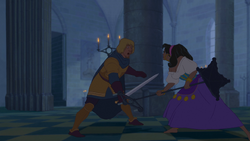
Phoebus confronts Esmeralda
A brief skirmish ensues with Phoebus complimenting Esmeralda's fighting skills and introduces himself, making it clear that he has no intention of arresting Esmeralda inside the cathedral, telling her, "Not as long as you're in here. I can't." The two are visibly drawn to each other at this point, and just when they're apparently about to kiss, Frollo and his soldiers appear. Esmeralda believes Phoebus lured them there, but Phoebus claims sanctuary for her, and the Archdeacon intervenes and orders Frollo out, forcing Phoebus to leave as well. However, he sneaks back inside and searches for Esmeralda, but can't find her. After Quasimodo is climbing back up after helping Esmeralda escape, Phoebus helps him up and asks if he's seen her. Quasimodo, who dislikes Frollo's soldiers greatly, almost successfully scares Phoebus away with a torch until Phoebus takes a moment to stop Quasimodo and to tell Esmeralda for him that he didn't mean to trap her inside Notre Dame, but it was the only way he could save her life. After getting Quasimodo's promise to tell her, he agrees to leave, and asks him to put him down as it's revealed Quasimodo was holding him up by the shirt. Quasimodo puts him down and, before leaving, Phoebus also wants Quasimodo to tell Esmeralda that she's very lucky to have a friend like him.

Phoebus rebels against Frollo and saves an innocent family
Unfortunately, after Quasimodo helps Esmeralda escape, Phoebus is forced to join Frollo on a ruthless manhunt for Esmeralda. Phoebus becomes increasingly disgusted with Frollo's unjust actions. When Frollo instructs Phoebus to burn down the house of a miller, even though the miller and his family are innocent of any crime, Phoebus draws the line there and rebels telling Frollo, "With all due respect sir, I was not trained to murder the innocent." and puts out the torch he was given to burn the house in a barrel of water. Frollo calls him an insolent coward and carries it out himself, though Phoebus quickly jumps through the window and rescues the family. This act, along with his refusal causes Phoebus to be branded as a traitor, and he is sentenced to death, but thanks to a diversion by Esmeralda, Phoebus almost escapes on Frollo's horse as he is cheered on by several villagers for his heroic deed. However, he's shot in the back by Frollo's soldiers and falls into the river, losing his armor in the process.

Phoebus and Esmeralda's first kiss.
He's rescued by Esmeralda, who takes him back to the cathedral and begs Quasimodo to help them. Phoebus and Esmeralda finally admit their feelings for each other and share a kiss, but Phoebus loses consciousness as Frollo returns. Quasimodo shows Esmeralda to the door and instructs her to "go down the south tower steps." Laverne then tells Quasimodo, "Quick, we gotta stash the stiff." and Phoebus is hidden by Quasimodo underneath a table. Frollo lets Quasimodo in on his plan to attack the Court of Miracles with his army. Immediately after he leaves, Phoebus awakens and implores Quasimodo to join him in finding the court and warning the people. He is surprised when Quasimodo says he can't and tells him, "I thought you were Esmeralda's friend." Phoebus further reminds him that Esmeralda stood up for him. Phoebus, completely disappointed in Quasimodo when he doesn't answer, goes alone, telling him, "Well I'm not going to stand by and watch Frollo massacre innocent people. You do what you think is right."
As Phoebus comes to the door, Quasimodo drops from the wall causing Phoebus to almost scream in fright before Quasimodo tells him, "Shh. I'm coming with you." As Phoebus recovers from the surprise he tells him, "Glad you changed your mind." The two use a pendant Esmeralda gave Quasimodo to find the court which they argue over whether or not it's a map as Quasimodo says as he insists, "I've been to the wars on four continents. I've got a pretty good idea of what a map looks like and this is not it." Finally, Phoebus gives in and tells Quasimodo, "If we're going to find Esmeralda, we have to work together." They follow the pendant's instructions and are led to the cemetery. After moving a tombstone, they find a passageway. As they walk through, Phoebus comments to Quasimodo who asks if what they're in really is the Court of Miracles, "Offhand, I'd say it's the court of ankle-deep sewage." As they go further, Phoebus becomes suspicious and tells Quasimodo that they should've run into trouble by then. When Quasimodo asks Phoebus for clarity, he explains, "You know; a guard, a booby trap-" his torch goes out and he finishes with, "or an ambush." Just then, as if on cue, the two are captured by Romani, who accuse them of being spies for Frollo, while disregarding their words to the contrary. Inside the court, they're nearly hanged by Clopin and the other Romani, until Esmeralda appears and clears up their misunderstanding. Phoebus then warns the Romani of Frollo's intentions. He takes a grateful hug from Esmeralda but, seeing Quasimodo's feelings for Esmeralda, he gives all the credit to Quasimodo for helping him find the court.
However, Frollo arrives (having secretly followed them) as he has them all arrested, and at one point, expresses mild surprise at Phoebus' supposed return from the dead, but promises to "remedy" it before long. He then announces, "There'll be a little bonfire in the square tomorrow, and you're all invited to attend." before ordering them all to be locked up.
At Esmeralda's execution, Quasimodo breaks free from the cathedral and rescues her. Phoebus watches from his cage giving Quasimodo a very proud smile and escapes, freeing himself and rallying the citizens and Romani to fight against Frollo's tyranny. Phoebus holds his own rather well during the fight, even pushing three thugs back at once with a spear. During the climactic battle between Frollo and Quasimodo, Phoebus is nowhere to be found, though he was possibly still fighting. However, when Esmeralda loses her grip on a dangling but unconscious Quasimodo, Phoebus, after finding a way into the cathedral unnoticed after Quasimodo and his gargoyle friends pour molten copper to prevent Frollo's soldiers from breaking down the door, catches Quasimodo before he can fall to his death.
Once he awakens and recognizes Phoebus as his rescuer, Quasimodo embraces and accepts Phoebus as his friend. Phoebus gently pats Quasimodo's back and helps him back up as Esmeralda comes to see them. Esmeralda looks at them standing next to each other equal in her eyes but only rushes to embrace Quasimodo. Phoebus stands aside leting them to be together. However Quasimodo realising he only loves Esmeralda as a friend takes Phoebus hand and joins it with Esmeralda's, and after silent agrement with Esmeralda he gives Phoebus his blessing of the latter's relationship with Esmeralda and accepts them both as his friends.
The Hunchback of Notre Dame II[]
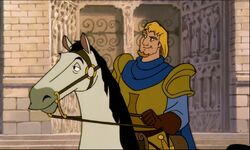
Phoebus continues to be captain of the guard.
Several years later, Phoebus has now married Esmeralda and had a son, Zephyr, with her. Once again, he is the Captain of the Guard under the new but unseen Minister of Justice. When Sarousch and his circus troupe arrive in Paris, people begin reporting thefts to Phoebus.
Eventually, Phoebus discovered the connection between the thefts and Sarousch and realizes that he and his gang are thieves dressed as circus performers, but this revelation causes a brief rift between himself, Quasimodo (who is in love with Sarousch's assistant, Madellaine), Esmeralda (who believes Phoebus carries a prejudice towards the Romani), and Zephyr (who admires the circus). He then meets with Sarousch to discuss his theory and manages to find one of the stolen items in the latter's office and confronts Sarousch on this matter. To his surprise, Sarousch then "confesses" to the crimes but tells Phoebus that his assistant Madellaine is actually the thief by mentioning her stealing past. Finding this information to be useful, he questions Sarousch as to where she was and is told she was out with Quasimodo, and he goes to find her after thanking Sarousch for his cooperation.
Phoebus finds the pair and arrests Madellaine, to Quasimodo's charging. Phoebus reveals she was the one stealing. Unknown to Phoebus, this arrest inadvertently aids Sarousch in stealing Notre Dame's most valuable bell, La Fidèle, from the cathedral by keeping both him and Quasimodo at bay. He realizes Sarousch's real intentions after the bell is rung and, believing her to be an accomplice in the crime, takes her away, while leaving Quasimodo heartbroken.
Phoebus then has the city put on lockdown to prevent Sarousch and his men from escaping. However, he is still unable to find them but Madellaine's true feelings for Quasimodo win over, and she reveals to Phoebus how Sarousch will get La Fidèle out of Paris, via underground. Though skeptical, he realizes he has very little leads and decides to follow her theory, but keeps her hands tied. Madellaine's deduction proves right as Phoebus and the guards locate Sarousch and tell him to surrender. Unfortunately, Sarousch had taken Zephyr hostage and uses him as leverage to keep Phoebus at bay, which forces Phoebus to relent as his son was in danger. Luckily, Zephyr is rescued by Quasimodo and Madellaine, and Phoebus orders Sarousch arrested.
Following this, Phoebus' relationship with his friends and family is mended, and in return for her help and saving his son, he sets Madellaine free in repayment. He and Esmeralda also proclaim their love for each other at the Festival, and then watch happily as Quasimodo and Madellaine proclaim their love for each other.
Musical[]
Phoebus appeared in both the German and North American versions of the production. While the musical version is closer to the original novel, Phoebus is more like his film version than the other characters as he becomes a friend to Quasimodo and is polite.
Video games[]
Kingdom Hearts 3D: Dream Drop Distance[]
Shortly after Sora's arrival in La Cité des Cloches, Phoebus alerts Claude Frollo about the presence of monsters running about in the streets, while Frollo interrogates Sora about being Romani. From the beginning, Phoebus does not believe Sora to be guilty of any crime, and runs off to aid him against the Dream Eaters. He witnesses Sora defeat the Dream Eaters and save Frollo's ward, Quasimodo. While Frollo does not approve of this, since he had wanted to teach Quasimodo a lesson for leaving the cathedral, this cements Sora's goodness in Phoebus' eyes. When Frollo falls for her, Esmeralda and begins a citywide manhunt for her, Phoebus begins to question his decision to serve Frollo.
Later on, when Frollo orders Phoebus to burn down the house of an innocent miller, Phoebus turns his sword on the mad judge just as Riku arrives on the scene. Frollo, however, summons the Bullet Gargoyle and flees. Realizing that Frollo may attack the Court of Miracles, Phoebus decides to find it first and warn the Romani, in the process crossing paths with Sora again. Though Sora is initially hesitant to trust Phoebus after seeing him with Frollo, Phoebus manages to convince the boy that they are on the same side. With help from Quasimodo, Phoebus and Sora find the Court of Miracles and warn Esmeralda, but Frollo follows them and subdues Sora and Phoebus with the Bullet Gargoyle while taking Esmeralda prisoner.
At Esmeralda's execution, Phoebus manages to escape from his cage and make his way into the cathedral. As he climbs upwards, he catches Quasimodo from falling to his death mere seconds after Frollo is killed. They reunite with Esmeralda, and Quasimodo blesses Phoebus' relationship with her.
Disney Parks[]
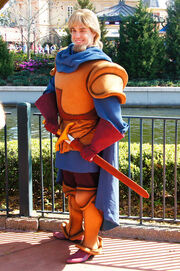
Phoebus appears a meetable character occasionally. He is most commonly seen in Disneyland Paris, although still very rare.
Walt Disney World[]
During the time of its run, Phoebus reprises his role from the film in the stage adaption of the film located in Disney's Hollywood Studios back when it was still named Disney's M.G.M. Studios.
He also makes occasional appearances at the France Pavilion in Epcot, though mostly for special events.
Relationships[]
Esmeralda[]
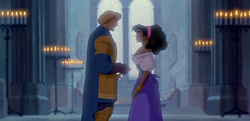
Phoebus was first introduced to Esmeralda as he was returning home from a war and she caught his attention while dancing for coins. At the Feast of Fools, her alluring performance immediately caught his attention again. After saving Quasimodo from the cruelty of Frollo and the people of Paris, Esmeralda sought refuge in the Notre Dame cathedral. Phoebus took the opportunity to meet her. However, their first interaction was rather rough, as Esmeralda found herself untrusting towards a member of Frollo's army. Nevertheless, Phoebus proves he has no intention of arresting Esmeralda, earning a modest token of gratitude before Frollo arrives and spoils the moment.
Later on, after seeing Phoebus betray Frollo and his laws in exchange for the lives of innocent Paris citizens, Esmeralda begins to warm up to the now-former soldier, and eventually saves his life from an attacking Frollo and his guards. That same night, after bringing him to Notre Dame to recover from the attack, Esmeralda and Phoebus share a soft conversation and soon find themselves falling in love, sharing a kiss. Later, in the Court of Miracles, when Phoebus realizes Quasimodo's feelings for Esmeralda, he decided to put his feelings for Esmeralda aside for the sake of respectin Quasimodos feeling. Later he step aside when Esmeralda rushes to embrace Quasimodo chosing him after he saves her from Frollo but luckly for Phoebus, Quasimodo realizes he only loves Esmeralda as a friend. After giving Phoebus and Esmeralda his blessing, the couple finally seal their relationship with another kiss.
Following the events of the film, the two apparently marry, and have a child, a boy named Zephyr. They are still very much in love as shown by their display of affection, though she was irritated by his distrust of the circus owned by Sarousch, believing they were thieves. Esmeralda considered this belief directed to Romani people as well and tension was made between them, but she soon saw he was right when their son was taken. At the end, they reconcile and were seen kissing.
Quasimodo[]
When Phoebus first saw Quasimodo, he had no issue with the hunchback's appearance, likely from seeing him at the festival. He even felt bad when Quasimodo was being tortured by the soldiers and asked Frollo permission to end the cruelty, but Frollo told him to wait a moment as Quasimodo needed to be taught a lesson. Later on, after Quasimodo helped Esmerelda escape, Phoebus came back to see her and asked Quasimodo if she was still there. Quasimodo, who at that point has had enough with soldiers, grabs a torch and tries to make Phoebus leave. During this time, Phoebus didn't act hostile or unkind in anyway, he instead tells Quasimodo to tell Esmerelda he didn't mean to trap her in Notre Dame, but he was trying to keep her from getting arrested by Frollo. Quasimodo agreed to tell Esmerelda if Phoebus left, he agrees and politely asks Quasimodo to put him down and to tell Esmerelda she's lucky to have Quasimodo for a friend which he is actually glad to hear. Eventually, Esmerelda is being hunted down by Frollo but Phoebus has become fed up with Frollo's methods and saves a family from being killed and tries to escape but is saved by Esmerelda after being shot. When Esmerelda asks Quasimodo to keep Phoebus safe until he's healed Quasimodo promises, even when Frollo visits, Quasimodo tries to keep Phoebus from being caught. After Frollo reveals his plan to attack the gypsies hideout tomorrow at dawn and leaves, Phoebus encourages Quasimodo to come with him but a still shocked Quasimodo refuses because Frollo is his master and he would be in big trouble. Phoebus reminds Quasimodo that Esmerelda saved him and points out his lack of gratitude and he states he's going and Quasimodo could come or not. Eventually, the Hunchback changes his mind but states he's doing it for Esmerelda. After showing Phoebus the pendent Esmerelda gave him he and Quasimodo have a fight over whether or not that is a map but decide to call a truce to find the Court of Miracles. They eventually find the court but are suspected to be spies for Frollo, despite their attempts to explain they are gagged and tied up. They are almost hung but Esmerelda saves them and Phoebus tells them that Frollo plans to attack at dawn. As they pack up, Esmerelda hugs Phoebus, thanking him for warning everyone but Phoebus notices Quasimodo's feelings so he gives all the credit to the hunchback, unfortunately for them Frollo has arrived as he trick them into believing he found the court but he only said that so they would lead him. When they are locked up, Quasimodo managed to escape his restraints and rescue Esmerelda, Phoebus was pleased to see this and in turn freed himself and rallied up the city. After Frollo had locked himself in the tower to finish Quasimodo, Phoebus somehow managed to get into the tower and saved Quasimodo from falling. He hugs Phoebus for saving him and gives the couple his blessing.
In the sequel, he and Quasimodo are close.
Achilles[]
Coming soon!
Claude Frollo[]
After spending years away at war, Phoebus was called back to Paris by Frollo. They first met when Phoebus witnessed Frollo having his last captain of the guards tortured. Frollo had heard about Phoebus' war record which was why he was hired by the judge to be the new captain. Even though he didn't approve of what the judge was doing, he acted respectfully towards him. Frollo then explained to Phoebus that he was trying to stop the Romani (gypsies) from taking over Paris. Phoebus questions why and Frollo explains that he had been taking care of the Romani for the last 20 years, but they always seem to thrive and now he plans to find their hideout. When the judge shows Phoebus what they will do to the gypsies (destroy them), Phoebus states the intentions are clear. Frollo takes a liking to Phoebus at this point, even though Phoebus doesn't like Frollo, and even invites him to the Festival of Fools which he must attend. While at the festivities, Phoebus and Frollo watch Esmerelda dance. While the judge finds it disgusting, Phoebus enjoys it. When Quasimodo and many other men are pulled onto the stage to be crowned the King of Fools, everyone is in shock, including Frollo. The joy doesn't last long as Quasimodo is abused with produce thrown at him and he begs for help when he is tied down. Phoebus asks Frollo to stop the cruelty, but the Judge wants Phoebus to wait as "a lesson needs to be learned." Eventually, Esmerelda gets up and saves him and defies the judge which Phoebus is impressed by. Eventually, Frollo orders him to arrest Esmerelda, but she escapes and the two show surprise when she is somewhere else. Esmerelda takes down the soldiers and escapes. Frollo orders Phoebus to bring her to him alive and Phoebus obliges. He finds her inside Notre Dame and Frollo finds them. He congratulates Phoebus and tells him to arrest Esmerelda. After a moment, Phoebus states that she claimed sanctuary (he did so for her) and they can't do anything. Frollo tells him to drag her outside but the Archdeacon intervenes telling them not to touch her so they are forced to leave.
Eventually Esmerelda escapes Notre Dame with Quasimodo's help, after hearing about her escape, Frollo initiates a manhunt for her with Phoebus coming along. After several interrogations and seeing the poor mistreatments of the Romani, Phoebus becomes furious at Frollo's methods but doesn't say a word. When a miller and his family are interrogated and locked inside, Frollo orders Phoebus to burn down the house with the family still inside as they are traitors. Phoebus politely refuses as he wasn't trained to murder the innocent, but Frollo states he was trained to follow orders. Nonetheless, Phoebus wants no part of this and puts out the torch. Frollo calls him a coward and burns down the mill, but Phoebus saves the family. For violating orders and defying Frollo, Phoebus is sentenced to death, Frollo states he threw away a promising career as Phoebus claims it was his highest honor. Thankfully, Esmerelda saves Phoebus and he escapes but not before getting shot at and thrown into the seine. After that the two became enemies and when all the Romani were found, Phoebus was among them and Frollo was impressed but not surprised that Phoebus survived but will remedy that.
Gallery[]
Trivia[]
- During his escape from Frollo, Phoebus is shown being shot in the back at his shoulder, but his injury was later shown and treated on the front of his chest. His breastplate can be seen when Esmeralda saves him from the river.
- An original pitch for the movie portrayed Phoebus as a more Gaston-like figure, described as a "log-headed soldier," and he played a smaller and more antagonistic role in the story, with Quasimodo envisioned as a "poetic soul" who would "put words in Phoebus' mouth." This changed after Tab Murphy took over as the head writer and decided to shift the focus of the story away from Quasimodo's romance and more towards his journey to be accepted by the people. Consequently, Phoebus became more heroic, central to the story, and Esmeralda's love interest, as he did in many of previews adaptations of Hugo's story, including his own Opera "La Esmeralda".
- An early treatment by Murphy depicted Phoebus as a combination of his character from the book and Pierre Gringoire (a poet character from the novel), making Phoebus a poetic knight who saw himself as a "lover, not a fighter." He prided himself on never lifting a sword in battle and aspired to become a poet despite his terrible poetry, with Quasimodo playing the role of a matchmaker and helping him write poetry for Esmeralda. This was changed after "Quasimodo the poet" angel was dropped.
- Despite being Captain of the Guard, Phoebus has his orders assigned from Judge Claude Frollo. By the sequel, however, he appears to have almost the same authority as Frollo had. He is the only authoritative figure shown inside the Palace of Justice.
- Phoebus is much older than Quasimodo, who is 20 years old. Phoebus says that has been away from Paris for two decades (though it's possible he was exaggerating). Assuming he joined the army between 15 and 18 years old, Phoebus could be in his mid to late 30s or even early 40s, significantly older than Quasimodo or Esmeralda. This makes his age range anywhere from 35 - 43.
- In the original novel by Victor Hugo, Phoebus was vain, untrustworthy, and a womanizer who only liked Esmeralda for her beauty. When Esmeralda was killed by Frollo, he watched her execution with little or no remorse. In the film, Phoebus is one of Quasimodo's good friends and the love interest of Esmeralda, despite the fact that he was once Frollo's Captain of the Guard before he refused to do the judge's evil bidding.
- In the film, Phoebus is one of three characters to absorb the traits of Pierre Gringoire from Hugo's original novel (the other two are Clopin and the gargoyle Hugo). He asks the guards to take him to the Palace of Justice, but is initially ignored, similar to the beginning of the novel where Gringoire attempts to entertain the Parisian audience with a play he wrote but is largely ignored. The part of the film where Phoebus enters Notre Dame to see Esmeralda, and Esmeralda turns against him at first, followed by Phoebus telling her that his name means "sun god", is reminiscent of Esmeralda rejecting Gringoire and Gringoire later telling her the meaning of the name "Phoebus" during their wedding night in the novel. Later in the film, Phoebus is nearly hanged by Clopin in the Court of Miracles, just as Clopin nearly hanged Gringoire. Most telling of all is Phoebus' respect and admiration for Esmeralda, mirroring that which Gringoire developed for Esmeralda after she saved his life.
- In the original novel, his full name was Phœbus de Châteaupers. In the film, Phoebus is just called by his first name. His full name in the film is unknown. However, in the musical, Phoebus' full name was Phoebus de Martin.
- According to the film's directors, Phoebus is the first Disney protagonist to have facial hair.
- Phoebus was originally going to take part in the fight with Frollo at the film's climax. However, due to directors and writer wanting the last third to focus more on Quasimodo and Esmeralda and toning down the romance subplot, Phoebus took over Clopin's role of leading the rebellion.
- Phoebus is the only character in the film that does not sing at all. However, he does have a solo in the deleted song "As Long As There's a Moon".
- In the scene where Phoebus is ordered to burn the miller's house, when Frollo reminds him that he was trained to follow orders, Phoebus was originally supposed to respond with "Not the orders of a mad man!" However, it was deleted to keep the ambiguity of whether Phoebus would follow through until the last second when he extinguishes the torch.
- A possible reason why Kevin Kline was cast as Phoebus is because the character's name ironically resembles the first name of Kline's wife, retired actress Phoebe Cates, well-known for portraying Kate Beringer in the Gremlins duology.
External links[]
| v - e - d | ||||||||||||||||||
|---|---|---|---|---|---|---|---|---|---|---|---|---|---|---|---|---|---|---|
|
| v - e - d | ||||||||||
|---|---|---|---|---|---|---|---|---|---|---|
|

